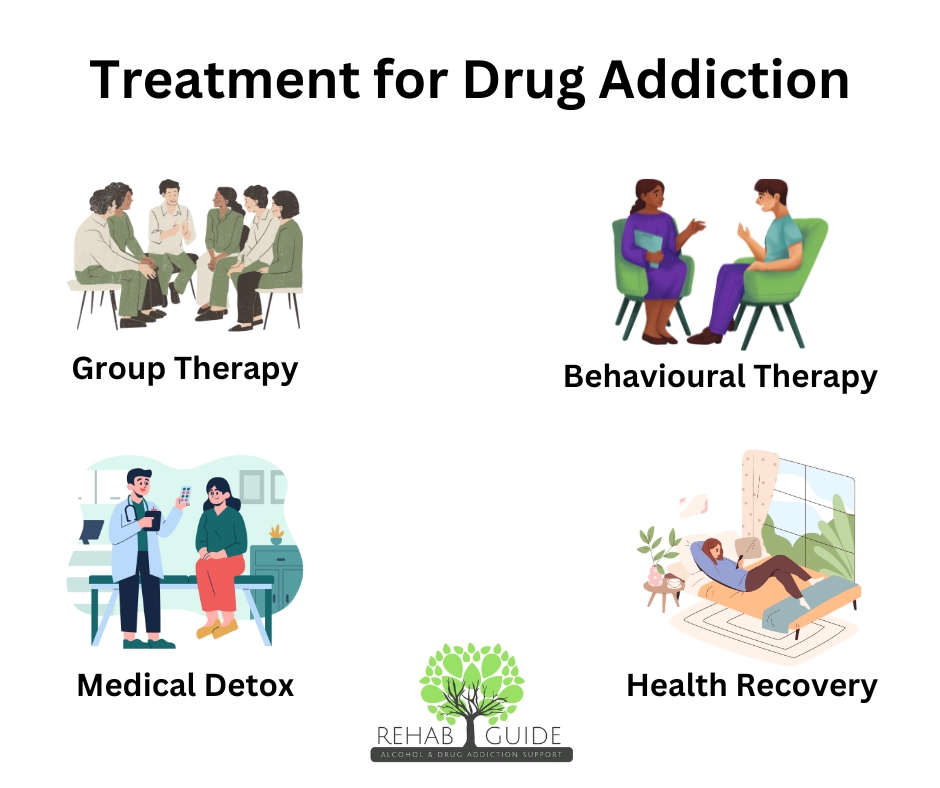A Comprehensive Guide to Substance Abuse Rehab
Substance Abuse rehab, usually described as rehabilitation, is an organized process developed to help individuals get rid of dependancy on medicines, alcohol, or other addictive materials. It is not just about detoxing-- it is a journey of psychological, emotional, and physical transformation. Rehab centers offer secure settings where individuals can confront the origin of their dependency, address mental triggers, and discover coping systems to sustain long-term soberness. This procedure is led by qualified professionals, consisting of therapists, medical physicians, and therapists that recognize the complex nature of addiction as both a physiological and behavioral problem.
Understanding the Core of Substance Abuse Abuse Recovery
At its core, recovery has to do with reconstructing an individual's life. Dependency often leaves deep scars-- strained relationships, economic distress, health and wellness problems, and mental illness. Through extensive rehab programs, individuals are provided the devices to fix these aspects gradually. Rehab isn't almost avoiding compounds; it has to do with redeeming control and rediscovering one's sense of self-respect. The programs emphasize framework, consistency, and individual liability, which are key to long-term recovery success. Every tiny milestone throughout rehab functions as a structure for lasting sobriety.
In addition, Substance Abuse recovery is not a one-size-fits-all approach. It recognizes that everyone's dependency tale is distinct-- what brought about Substance Abuse misuse, exactly how it progressed, and just how healing can be continual vary widely. Treatment facilities customize treatment strategies based on private evaluations, ensuring that every individual gets support that aligns with their psychological state, dependency history, and life circumstances. This personalized approach considerably improves healing results and aids stop relapse as soon as people rehabilitate into everyday life.
The Advantages of Inpatient Rehab Programs
Inpatient rehabilitation, additionally known as domestic treatment, supplies one of one of the most reliable approaches for those fighting serious Substance Abuse dependency. Among its key advantages is the distraction-free and structured setting. When a person gets in an inpatient center, they are momentarily eliminated from external triggers-- such as friends that use substances, difficult work environments, or family members disputes-- that may hinder their recovery. This isolation from negative influences permits people to concentrate totally on recovery. Living within a encouraging and monitored setting produces the stability needed to damage old habits and form healthier patterns of behavior.
An additional significant benefit of inpatient rehab is the 24/7 professional supervision available to each patient. Withdrawal symptoms from medicines or alcohol can be uncertain and, in some situations, serious. Inpatient centers have clinical groups that supply day-and-night care, ensuring people are secure and comfy during detoxing. Past physical health, continual supervision also supplies psychological peace of mind-- patients recognize that help is readily available at any kind of time, which decreases anxiety and constructs depend on in the recovery procedure. This immediate accessibility to medical and psychological support significantly boosts the success rate contrasted to outpatient care for extreme addictions.
Inpatient rehab programs promote a solid feeling of community and accountability. Patients engage with others that share similar struggles, join group treatment, and take part in activities that urge team effort and compassion. This environment nurtures common understanding and decreases sensations of seclusion typically associated with addiction. By attaching with peers and learning from their experiences, individuals establish social bonds that proceed to support them even after leaving the facility. This feeling of belonging, incorporated with consistent expert support, makes inpatient rehabilitation a highly effective structure for lasting recovery.
Inpatient Rehab Solutions Used
Inpatient recovery facilities offer a diverse variety of solutions made to deal with the mind, spirit, and body concurrently. The initial phase generally includes clinical detoxing, a procedure that securely gets rid of materials from the body while taking care of withdrawal signs and symptoms. Detoxification is supervised by doctor who may administer medication to ease pain and avoid issues. Clients transition to organized day-to-day programs that include therapy, health, and counseling activities once detoxification is total. This incorporated technique makes certain that people not just get rid of physical dependancy however likewise address emotional and psychological facets of addiction.
Therapeutic solutions go to the heart of inpatient rehabilitation. Facilities offer person therapy sessions, where people work one-on-one with accredited specialists to discover the underlying root causes of their dependency-- such as injury, mental health conditions, or unresolved psychological pain. Cognitive-behavioral treatment (CBT), dialectical habits treatment (DBT), and motivational talking to are among one of the most common evidence-based approaches used. In enhancement, group treatment sessions provide a helpful space for individuals to share experiences, gain viewpoint, and create interpersonal abilities. Family treatment is additionally frequently consisted of, helping to reconstruct trust and boost communication between individuals and their loved ones.
Beyond standard treatment, lots of inpatient programs include alternative and entertainment solutions to advertise total wellness - addiction treatment. Yoga, meditation, art therapy, and health and fitness programs help in reducing anxiety and educate mindfulness. Nutritional counseling guarantees that people rebuild physical health, as Substance Abuse typically diminishes the body's crucial nutrients. Some rehabilitation focuses even use occupation training and educational workshops to help clients prepare for reintegration into society. These diverse services are made to recover the entire individual-- not simply deal with dependency signs and symptoms-- by cultivating resilience, balance, and purpose
Why You Should Think About Outpatient Programs
While inpatient rehab offers an immersive and extensive strategy, outpatient programs supply an option that permits adaptability for people who can not commit to full-time household therapy. Outpatient rehab enables clients to receive structured treatment and medical support while keeping their everyday responsibilities-- such as college, family, or work treatment. For lots of individuals with mild to modest addiction, outpatient therapy uses the perfect equilibrium between recuperation and everyday life. It enables clients to practice the coping abilities they learn in real-world settings, enhancing their resilience despite daily obstacles.
Another factor to think about outpatient programs is their cost-effectiveness. Inpatient treatment can be costly as a result of lodging, dishes, and 24-hour supervision, which might not be financially practical for everyone. Outpatient programs, nonetheless, generally set you back less since they do not call for domestic keeps. Many centers supply sliding-scale payment choices or approve insurance coverage to make treatment obtainable. For those that have actually already finished inpatient rehab, transitioning right into an outpatient program works as a beneficial continuum of care, aiding preserve liability and stop relapse with ongoing assistance.
In addition, outpatient programs provide a high level of personalization. People can choose in between partial hospitalization programs (PHP), extensive outpatient programs (IOP), or common outpatient treatment, relying on their degree of demand. Each option offers varying degrees of structure and time commitment. IOPs commonly involve several therapy sessions per week, while conventional outpatient care may include regular counseling sees. This adaptability makes certain that people can receive professional help tailored to their healing phase, making outpatient programs a sensible and encouraging selection for long-term recovery upkeep.

Discovering Various Other Treatment Options in Substance Abuse Abuse Healing
Past outpatient and additional info inpatient rehab, there are a number of various other treatment options readily available for individuals seeking recuperation from Substance Abuse addiction (substance abuse treatment Morris County). Medication-assisted treatment (FLOOR COVERING) is one such strategy, combining recommended drugs with try this website behavioral therapy to handle withdrawal signs and reduce desires. Medications like buprenorphine, methadone, or naltrexone are commonly used in opioid addiction treatment, while acamprosate or disulfiram may sustain alcohol recuperation. Floor covering assists stabilize mind chemistry, permitting people to concentrate on therapy and way of living adjustments without the frustrating discomfort of withdrawal

Different therapies are also coming to be progressively popular basically Abuse treatment. These may consist of holistic techniques like acupuncture, equine therapy, adventure-based therapy, and spiritual healing programs. While these strategies may not replace standard therapy, they can enhance it by enhancing psychological guideline, self-awareness, and confidence. The objective of exploring various treatment alternatives is to create a recuperation plan that reverberates with each individual's worths, beliefs, and way of life. A personalized combination of treatments typically yields the most lasting results, equipping people to live a satisfying, substance-free life.
The Course to Long-Term Sobriety and Healing
Finishing rehab-- whether inpatient or outpatient-- is only the start of a lifelong healing trip. Aftercare programs play an essential duty in maintaining sobriety and protecting against relapse. These programs may consist of ongoing therapy, support system like Narcotics Anonymous or Alcoholics Anonymous, and sober living setups that provide continued framework. Uniformity and community are important; people that stay connected to healing networks are most likely to sustain long-lasting development. Rehabilitation teaches the required coping skills, however aftercare makes certain that those abilities are applied and strengthened in real-life scenarios.
Long-term recovery likewise depends upon way my blog of life adjustments that sustain psychological and physical health. Establishing healthy behaviors-- such as normal exercise, well balanced nourishment, and mindfulness practices-- assists bring back equilibrium to the body and mind. Participating in purposeful tasks like offering, seeking hobbies, or reconnecting with loved ones can load the psychological gap left by Substance Abuse use. Concentrating and creating a favorable attitude on future objectives provide recovering individuals a restored feeling of identification and instructions. Sobriety is not about deprivation; it has to do with redeeming life's splendor and chances.

Through detailed rehab programs, individuals are provided the tools to repair these elements slowly. Inpatient rehab programs foster a strong feeling of area and liability. While inpatient rehabilitation uses an immersive and intensive approach, outpatient programs give a choice that enables flexibility for individuals who can not commit to permanent household therapy. Outpatient rehabilitation enables patients to obtain structured therapy and clinical assistance while preserving their daily responsibilities-- such as household, school, or job care. Past outpatient and inpatient rehab, there are numerous other therapy alternatives offered for individuals looking for recovery from Substance Abuse dependency.